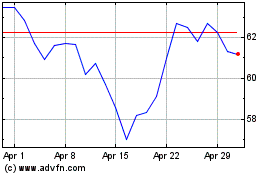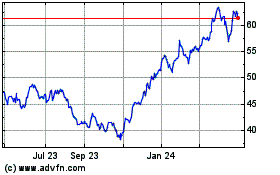By Aruna Viswanatha
In the summer of 2010, Citigroup Inc. traders circulated a news
report about attempts to manipulate a financial benchmark used to
calculate a wide range of interest-rate products. One messaged:
"GAME OVER." "[O]h jesus do I want to read this?," chimed in
another, according to a document recounting the exchanges released
Wednesday by regulators.
By then U.S. regulators and law enforcement authorities were
deep into multiple investigations into whether top global banks
tried to game interest rate benchmarks.
Six years later, Citigroup Inc.'s banking unit signed a
settlement, announced Wednesday, over the allegations, the latest
bank to enter into an agreement following more than a dozen
settlements to resolve banks' alleged rigging. Citigroup agreed to
pay $425 million to end long-running civil probes into the bank's
alleged manipulation of two key benchmarks. It is the first U.S.
bank to resolve claims related to the Libor benchmark.
Specifically, the bank agreed to pay $250 million to resolve
claims from the Commodity Futures Trading Commission that it tried
to manipulate the ISDAFIX benchmark swaps rate, which is used to
settle interest rate swaps, between 2007 and 2012. It agreed to pay
an additional $175 million to resolve claims from the regulator
that it tried to rig the Yen Libor and Euroyen Tibor interest rate
benchmarks in 2010. Libor and Tibor are based on banks' borrowing
costs and serve as benchmarks for trillions of dollars in financial
instruments.
A half-dozen European banks have already settled criminal or
civil claims tied to Libor rigging, but Citi is the first U.S. bank
to do so.
The initial Libor investigations quickly expanded to examine
similar patterns in other products. Last May, five global banks
including Citi and J.P. Morgan Chase & Co. agreed to pay more
than $5 billion to resolve probes into whether traders colluded to
move foreign currency rates for their own benefit.
"We will vigorously continue to investigate any efforts to
manipulate financial benchmarks," the CFTC's enforcement director,
Aitan Goelman, said in announcing Wednesday's Citi agreement.
Citi said in a statement it had adopted "industry-wide reforms"
in participating in benchmark rates and made "substantial
investments" in controls to monitor for inappropriate behavior.
"These settlements represent a significant step for Citi in
resolving its legacy benchmark rate investigations," the bank said.
It neither admitted nor denied the agency's findings.
Citi is the second bank after Barclays PLC to resolve claims
related to the ISDAfix benchmark, which firms ranging from hedge
funds to manufacturing companies use to settle swaps designed to
protect against fluctuation in interest rates.
A Justice Department spokesman said the department had closed
its ISDAfix investigation into Citigroup and Barclays, but declined
to comment on whether it had ended its probe into Libor
manipulation for Citi.
According to the CFTC order, Citi's customers began to notice at
some point after 2007 potential issues with how the rate was set.
One customer sent a message to a Citi trader, according to the
settlement: "[E]ach person tells me that there is no manipulation
by the traders; however, the coincidence of us losing on everyone
but one fixing...is starting to get old."
The CFTC on Wednesday also accused Citi of falsely reporting
rates used to determine U.S. dollar Libor during the 2008 financial
crisis to make the bank appear healthier than it was. Libor, the
London interbank offered rate, serves as an index for $500 trillion
in products, including loans and interest rate futures
contracts.
Both benchmarks are largely set via a panel of banks who submit
daily their own borrowing costs, in the case of Libor, or their
offers and bids for interest rate swaps, in the case of ISDAfix.
(The ISDAfix rate is also influenced by actual trades.)
Citi and other banks misreported their own rates in order to
benefit trading positions dependent on those benchmarks, regulators
said.
The Citi Libor allegations largely revolve around one trader,
Tom Hayes, who is serving an 11-year prison sentence in London for
trying to rig the rate.
The CFTC order also identifies Mr. Hayes's boss, a senior
manager on the Tokyo interest rate derivatives trading desk, Chris
Cecere, who, it says, pressured Tibor submitters to adjust
submissions to benefit Mr. Hayes' positions. On a few occasions,
the CFTC said, Mr. Cecere's requests were taken into account.
Neither man was named by the CFTC, but both have been identified in
previous cases. Mr. Cecere couldn't be located for comment.
Citigroup hired Mr. Hayes from UBS to enhance its reputation in
the Tokyo derivatives market in 2009, authorities said, and Mr.
Hayes used his contacts at other panel banks to influence Yen Libor
submissions. According to the order, the Tibor submitters
eventually grew tired of Mr. Cecere's requests and elevated
concerns to management. in June 2010 the bank erected a firewall to
limit such requests. Citigroup fired Mr. Hayes in September
2010.
Separately, according to the CFTC, in the spring of 2008 through
the summer of 2009, Citi based its U.S. dollar Libor submissions
"on a desire to avoid generating negative media attention and to
protect Citi's reputation in the market," even though it was
experiencing liquidity concerns. According to the filing, one Citi
Libor submitter said, "note that our 1-6 mths LIBORs were the
highest out of all contributors. Given the potential negative
publicity that this could have I would go lower..."
The Wall Street Journal in 2008 reported on banks' potential
fibbing on their Libor submissions, sparking the CFTC
investigation.
The bank knew it was under investigation, but managers didn't
report Mr. Hayes's attempted manipulation even though he talked
openly about how he did it at his prior bank, the CFTC said. For
example, according to the order, Mr. Hayes told a manager that he
"just calls his cash guys and asks them to move the LIBORs up or
down, depending on how his fixings were...."
On ISDAFIX, Citi also bid and executed trades in certain
interest rate products at times and prices designed to influence
the daily published rate, the regulator said. One Citi trader
described ISDAfix in electronic communications as "surprising[ly]
easy to push," according to the CFTC order.
As early as 2007, after one Citi swaps trader commented about
market illiquidity around the 11 a.m. setting of the rate, another
Citi trader said, according to the order: "[I] suspect it's because
of Isdafix...[T]hat's when people start scrooing [sic] around with
things."
The bank changed its ISDAfix submissions process in October
2012, the regulator said.
Write to Aruna Viswanatha at Aruna.Viswanatha@wsj.com
(END) Dow Jones Newswires
May 25, 2016 16:03 ET (20:03 GMT)
Copyright (c) 2016 Dow Jones & Company, Inc.
Citigroup (NYSE:C)
Historical Stock Chart
From Mar 2024 to Apr 2024

Citigroup (NYSE:C)
Historical Stock Chart
From Apr 2023 to Apr 2024
